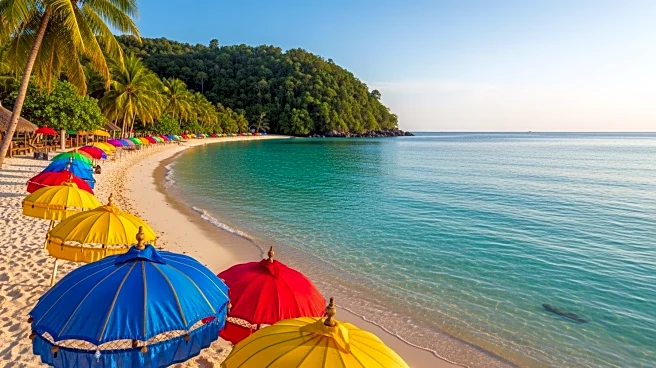What's Happening?
The Indonesian government is actively transforming the island of Lombok into a major tourist destination, similar to Bali, as part of a broader strategy to diversify the country's tourism industry. Lombok,
known for its pristine beaches and Mount Rinjani, is being developed to attract tourists away from the overcrowded Bali. The initiative, dubbed 'Bali-fication,' involves significant infrastructure investments, including the construction of luxury resorts and a racetrack in Mandalika. However, this development has led to the eviction of local residents, raising concerns about inadequate compensation and resettlement plans. The transformation aims to boost the local economy by creating jobs and attracting foreign investment, but it also poses challenges to the island's cultural identity and environmental sustainability.
Why It's Important?
The 'Bali-fication' of Lombok is significant as it highlights the Indonesian government's efforts to decentralize tourism and reduce the pressure on Bali, which has been facing issues like traffic congestion and pollution due to its popularity. This development could potentially boost Lombok's economy by increasing tourism revenue and creating employment opportunities. However, the rapid transformation raises concerns about the displacement of local communities and the preservation of Lombok's cultural heritage. The initiative also underscores the broader challenges of balancing economic growth with social and environmental responsibilities, as the influx of tourists could lead to cultural erosion and environmental degradation if not managed sustainably.
What's Next?
As Lombok continues to develop, the government and stakeholders will need to address the concerns of local communities regarding fair compensation and resettlement. There is also a need for sustainable tourism practices to ensure that the island's natural beauty and cultural identity are preserved. The success of Lombok's transformation will depend on how well these issues are managed, and whether the benefits of tourism can be equitably distributed among local residents. Additionally, the government may face increased scrutiny from human rights organizations and environmental groups, which could influence future development policies.
Beyond the Headlines
The transformation of Lombok into a tourist hub raises deeper questions about the impact of globalization on local cultures and economies. The 'Bali-fication' process could lead to a homogenization of cultural experiences, where unique local traditions are overshadowed by commercial interests. This development also highlights the ethical considerations of tourism-driven economic policies, where the rights and livelihoods of local communities must be balanced against the pursuit of economic growth. The situation in Lombok could serve as a case study for other regions facing similar challenges, emphasizing the need for inclusive and sustainable development strategies.









